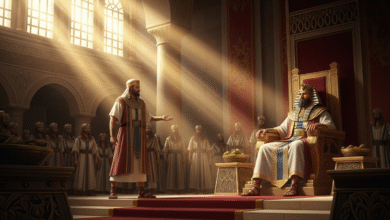The story of Ibrahim, peace be upon him: The journey of monotheism, breaking idols, and building the Kaaba

In the annals of the great prophets, Ibrahim, peace be upon him, stands tall as a prophet and messenger, chosen by God to be an imam for people and a symbol of pure monotheism. His story is not just a tale to be told, but a school of faith, full of great trials and sacrifices, in which the highest meanings of submission to God’s command and certainty of His promise were manifested. His life was a continuous journey in inviting people to worship God alone and purify the earth from the abomination of polytheism.
Searching for Truth in the Time of Jahiliyyah
Abraham, peace be upon him, was born in the land of Babylon, in a people steeped in the worship of idols and planets, and his father (Azer) was an idol maker. From a young age, his heart did not find comfort in these false idols. He began meditating on the kingdom of the heavens and the earth, contemplating the bright stars, the illuminated moon and the shining sun, and asking himself: Are these the true gods?
Evidence: The Qur’an depicts this intellectual journey in Surat al-An’am:
وَكَذَٰلِكَ نُرِي إِبْرَاهِيمَ مَلَكُوتَ السَّمَاوَاتِ وَالْأَرْضِ وَلِيَكُونَ مِنَ الْمُوقِنِينَ (75) فَلَمَّا جَنَّ عَلَيْهِ اللَّيْلُ رَأَىٰ كَوْكَبًا ۖ قَالَ هَٰذَا رَبِّي ۖ فَلَمَّا أَفَلَ قَالَ لَا أُحِبُّ الْآفِلِينَ (76) فَلَمَّا رَأَى الْقَمَرَ بَازِغًا قَالَ هَٰذَا رَبِّي ۖ فَلَمَّا أَفَلَ قَالَ لَئِن لَّمْ يَهْدِنِي رَبِّي لَأَكُونَنَّ مِنَ الْقَالِّينَ (77) فَلَمَّا رَأَى الشَّمْسَ بَازِغَةً قَالَ هَٰذَا رَبِّي هَٰذَا أَكْبَرُ ۖ فَلَمَّا أَفَلَتْ قَالَ يَا قَوْمِ إِنِّي بَرِيءٌ مِّمَّا تُشْرِكُونَ (78) إِنِّي وَجَّهْتُ وَجْهِيَ لِلَّذِي فَطَرَ السَّمَاوَاتِ وَالْأَرْضَ حَنِيفًا ۖ وَمَا أَنَا مِنَ الْمُشْرِكِينَ (79)
(Surat al-An’am: 75-79).
Ibrahim, peace be upon him, was guided by his sound instincts and God’s guidance to the monotheism of the Creator, and that there is no god but God.
Confronting polytheism: Breaking idols and challenging his people
Having established certainty in his heart, Ibrahim, peace be upon him, began his call to his people in a wise manner, trying to convince them of the corruption of their beliefs. He called his father gently, showing him the error of idolatry, but his father stubbornly refused.
Abraham was not content with preaching with his tongue, but decided to prove to his people that their idols were invalid. On the day of their feast, when they went out to celebrate, Abraham entered their temple and smashed all the idols, except for a large one, to leave them proof of their impotence.
Evidence: The Qur’an mentions this event in Surat al-Anbiya:
فَجَعَلَهُمْ جُذَاذًا إِلَّا كَبِيرًا لَّهُمْ لَعَلَّهُمْ إِلَيْهِ يَرْجِعُونَ (58) قَالُوا مَن فَعَلَ هَٰذَا بِآلِهَتِنَا إِنَّهُ لَمِنَ الظَّالِمِينَ (59) قَالُوا سَمِعْنَا فَتًى يَذْكُرُهُمْ يُقَالُ لَهُ إِبْرَاهِيمُ (60) قَالُوا فَأْتُوا بِهِ عَلَىٰ أَعْيُنِ النَّاسِ لَعَلَّهُمْ يَشْهَدُونَ (61) قَالُوا أَأَنتَ فَعَلْتَ هَٰذَا بِآلِهَتِنَا يَا إِبْرَاهِيمُ (62) قَالَ بَلْ فَعَلَهُ كَبِيرُهُمْ هَٰذَا فَاسْأَلُوهُمْ إِن كَانُوا يَنطِقُونَ (63) فَرَجَعُوا إِلَىٰ أَنفُسِهِمْ فَقَالُوا إِنَّكُمْ أَنتُمُ الظَّالِمُونَ (64) ثُمَّ نُكِسُوا عَلَىٰ رُءُوسِهِمْ لَقَدْ عَلِمْتَ مَا هَٰؤُلَاءِ يَنطِقُونَ (65)
(Surat al-Anbiya: 58-65).
This was a compelling argument from Abraham, peace be upon him, but his people, instead of recognizing the truth, resorted to force.
Plagued by fire: The Miracle of Divine Protection
Ibrahim’s people were very angry at his destruction of their idols and decided to burn him alive. They gathered a lot of firewood, built a great fire, the likes of which had never been seen, and threw Ibrahim into it using a catapult.
At this critical moment, as Ibrahim was thrown into the fire, he had only his Lord to rely on. He said his immortal sentence: “Hassabi Allah and Na’im al-Wakeel.” Then came the divine command that changed the nature of the fire, making it neither burn nor harm.
Evidence: Allah says in Surat al-Anbiya:
قَالُوا حَرِّقُوهُ وَانصُرُوا آلِهَتَكُمْ إِن كُنتُمْ فَاعِلِينَ (68) قُلْنَا يَا نَارُ كُونِي بَرْدًا وَسَلَامًا عَلَىٰ إِبْرَاهِيمَ (69) وَأَرَادُوا بِهِ كَيْدًا فَجَعَلْنَاهُمُ الْأَخْسَرِينَ (70)
(Surat al-Anbiya: 68-70).
Ibrahim, peace be upon him, came out of the fire safe and sound, which was a remarkable miracle and a clear proof of the truthfulness of his prophethood and the greatness of God who protects His servants. But his people, despite seeing this sign, continued in their stubbornness and disbelief.
Blessed migration: Building a monotheistic nation
After surviving the fire, Ibrahim (peace be upon him) realized that there was no point in staying with his unbelieving people. He, along with his wife Sarah and his nephew Lot, migrated from Babylon to the land of Babylon to the land of the Levant, then to Egypt, and then back to the Levant to spread the call of monotheism to the corners of the earth. These migrations were part of God’s plan to prepare Ibrahim to be the Imam and founder of the monotheistic nation.
The scourge of slaughter: The pinnacle of surrender and sacrifice
One of the greatest trials that Ibrahim, peace be upon him, was subjected to, and showed the extent of his absolute submission to the command of his Lord, was God’s command to slaughter his son Ishmael, after God gave him to him in old age, and after a long wait. Ibrahim saw the vision and knew it was God’s command.
Abraham brought the matter to his son Ishmael, who was the epitome of a righteous and obedient son. Ishmael responded with certainty and authorization: “O father, do as you are commanded, and you will find me, God willing, among the patient” (Al-Safat: 102).
When Abraham, peace be upon him, threw his son on his forehead in preparation for slaughter, God intervened and redeemed him with a great sacrifice.
Evidence: The Qur’an describes this majestic situation in Surah Al-Safat:1
فَلَمَّا بَلَغَ مَعَهُ السَّعْيَ قَالَ يَا بُنَيَّ إِنِّي أَرَىٰ فِي الْمَنَامِ أَنِّي أَذْبَحُكَ فَانظُرْ مَاذَا تَرَىٰ ۚ قَالَ يَا أَبَتِ افْعَلْ مَا تُؤْمَرُ ۖ سَتَجِدُنِي إِن شَاءَ اللَّهُ مِنَ الصَّابِرِينَ (102) فَلَمَّا أَسْلَمَا وَتَلَّهُ لِلْجَبِينِ (103) وَنَادَيْنَاهُ أَن يَا إِبْرَاهِيمُ (104) قَدْ صَدَّقْتَ الرُّؤْيَا ۚ إِنَّا كَذَٰلِكَ نَجْزِي الْمُحْسِنِينَ (105) إِنَّ هَٰذَا لَهُوَ الْبَلَاءُ الْمُبِينُ (106) وَفَدَيْنَاهُ بِذِبْحٍ عَظِيمٍ (107)
(Surat al-Safat: 102-107).
This test was proof of Ibrahim’s status with God and his great patience and submission, and was immortalized in the ritual of Eid al-Adha, which Muslims observe every year.
Construction of the Kaaba: Unitarian Universalist Center
One of Ibrahim’s greatest achievements was the construction of the Kaaba in Mecca. God ordered him to build this house to be the first house built for people, and a place where Muslims gather to worship God alone. Abraham built the Kaaba with his son Ishmael, as they worked in obedience to God and prayed to their Lord for acceptance and blessing.
Evidence: The Almighty said:
وَإِذْ يَرْفَعُ إِبْرَاهِيمُ الْقَوَاعِدَ مِنَ الْبَيْتِ وَإِسْمَاعِيلُ رَبَّنَا تَقَبَّلْ مِنَّا إِنَّكَ أَنتَ السَّمِيعُ الْعَلِيمُ (127) رَبَّنَا وَاجْعَلْنَا مُسْلِمَيْنِ لَكَ وَمِن ذُرِّيَّتِنَا أُمَّةً مُّسْلِمَةً لَّكَ وَأَرِنَا مَنَاسِكَنَا وَتُبْ عَلَيْنَا إِنَّكَ أَنتَ التَّوَّابُ الرَّحِيمُ (128)
(Surat al-Baqarah: 127-128).
God also commanded him to call the people to Hajj, so that the Kaaba would be a qiblah for Muslims, a global spiritual center of monotheism, and a constant reminder of Abraham’s pure message.
Conclusion: The Father of Prophets and Founder of Monotheism
The story of Ibrahim, peace be upon him, is a comprehensive story of faith that teaches us the meaning of pure monotheism, beautiful patience, sacrifice for the sake of God, and submission to His commands, no matter how difficult they may be. Ibrahim was the father of the prophets and a model of the believer who confronts polytheism with proof and argument, and stands firm on the truth no matter the challenges. His whole life was a practical invitation to God and a presentation of the principles on which the religion of Islam is based, making him a role model for anyone who wants to follow the path of faith and certainty.
What is the most important lesson you took away from the story of Ibrahim and his sincerity in monotheism?




